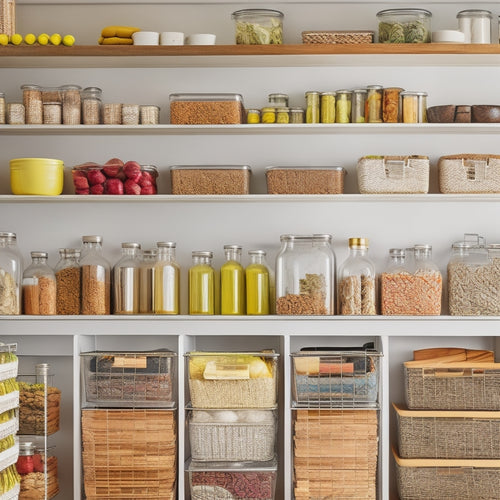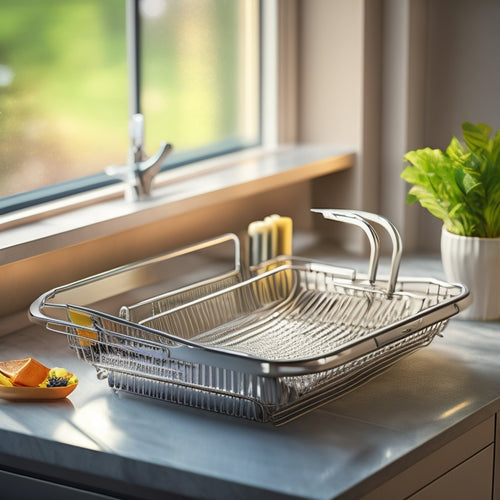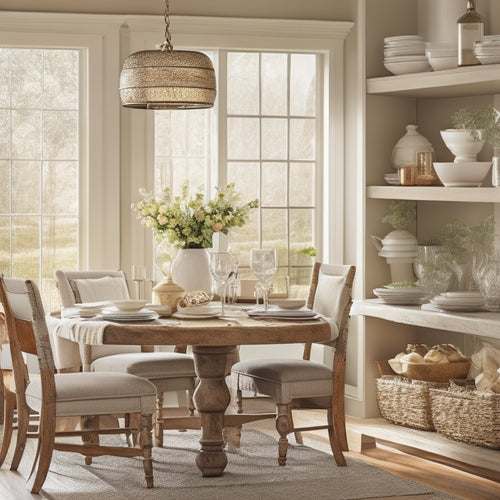
Why Special Diets Require Custom Kitchen Storage Solutions
Share
When cooking for special diets, you need a tailored kitchen storage system to guarantee safety and efficiency. Conventional storage solutions can lead to mistakes, contamination, and wasted time. Custom storage helps you organize and easily retrieve ingredients, reducing the risk of errors. With personalized storage, you can designate areas for specific diets, track ingredients, and maintain a clean environment. This tailored approach supports meal prep and healthier choices. By adapting your kitchen storage to your unique needs, you'll save time and stress. Now, take a closer look at how customized solutions can transform your cooking experience.
Key Takeaways
• Custom kitchen storage solutions ensure safe and efficient food storage for special diets, reducing the risk of cross-contamination and mistakes.
• Visibility and accessibility are crucial for safe ingredient retrieval, making clear labeling and organized pantry and fridge spaces essential.
• Designated storage areas and zones prevent cross-contamination and support meal prep and healthier choices for individuals with unique dietary needs.
• Adaptable cabinet configurations, ridge labeling, and space-saving design elements cater to specific dietary requirements and ingredient storage needs.
• Personalized storage solutions promote independence and confidence in the kitchen, allowing individuals with special diets to cook with ease and safety.
Custom Storage for Dietary Needs
When managing a special diet, having a personalized kitchen storage system can make a significant difference in guaranteeing that you stay on track and organized. A well-designed pantry organization system, for instance, can help you easily locate the ingredients you need, while keeping those you can't have out of sight. This is especially important when you're dealing with food allergies or intolerances, where accidental consumption can have serious consequences.
In addition to pantry organization, a thoughtful refrigerator layout can also be a game-changer. By designating specific shelves or bins for your dietary staples, you can guarantee that you're always reaching for the right foods. This can be particularly helpful when you're cooking for multiple people with different dietary needs. By keeping similar items together, you can avoid cross-contamination and reduce the risk of mistakes.
With a personalized storage system, you can focus on cooking healthy, delicious meals that meet your dietary requirements, rather than worrying about what's hiding in the back of the pantry or fridge.
Food Sensitivity Storage Solutions
You'll want to think about storage solutions that prioritize visibility and accessibility to make certain that you can easily identify and retrieve the ingredients that work for your specific dietary needs, especially when dealing with food sensitivities. This is important to guarantee your safety and avoid any adverse reactions.
Here are some essential considerations for your food sensitivity storage solutions:
-
Designate an allergen-free pantry or section in your kitchen to store safe ingredients, keeping them separate from potential allergens.
-
Implement a fridge organization system that categorizes and labels your food, making it easy to identify what you can and can't eat.
-
Use airtight containers and bins to prevent cross-contamination and spoilage.
-
Label and date leftovers and prepared meals to make sure you know what's safe to consume and when.
-
Keep a 'safe foods' list or app to track your tolerable ingredients and stay informed about new products and recipes.
Efficient Storage for Meal Prep
By optimizing your kitchen storage for meal prep, you can streamline your cooking process, reduce food waste, and make healthier choices more convenient.
A well-organized pantry is essential for meal planning, allowing you to see what ingredients you have on hand and plan your meals accordingly. Consider categorizing your pantry items by type, such as grains, proteins, and vegetables, and store them in airtight containers to maintain freshness.
When it comes to your fridge, a thoughtful layout can make a big difference. Designate specific zones for different types of food, such as raw meats, cooked leftovers, and fresh produce. This will help prevent cross-contamination and make it easier to find what you need when you need it.
Don't forget about your cooking tools – store them in a convenient location, such as a utensil organizer or a pegboard, to keep them within easy reach.
Kitchen Organization for Restricted Diets
Organizing your kitchen to accommodate a restricted diet requires a thoughtful approach to storage and meal planning, particularly when dealing with specific dietary needs or allergies. You need to create a safe and efficient space that guarantees cross-contamination is minimized and allergens are kept separate.
To achieve this, consider the following essential elements of kitchen organization for restricted diets:
-
Pantry organization: Designate specific shelves or bins for specific dietary needs, such as gluten-free or vegan products, to prevent unintended exposure.
-
Fridge layout: Assign specific zones for raw meat, dairy, and prepared meals to avoid cross-contamination.
-
Labeling and signage: Clearly label storage containers, shelves, and fridge zones to make sure everyone in the household understands what's safe and what's not.
-
Separate cooking stations: Designate specific cooking areas for different diets to avoid cross-contamination during meal prep.
-
Cleaning protocols: Establish strict cleaning schedules and protocols to prevent residue buildup and maintain a safe cooking environment.
Storage for Specialized Ingredients
When you're managing a special diet, you're likely working with a range of unique ingredients that require careful storage.
You'll need to categorize these ingredients thoughtfully, considering factors like bulk storage options and expiration date tracking to guarantee they stay fresh and usable.
Special Ingredient Categories
You'll likely find that certain specialized ingredients, such as gluten-free flours or vegan alternatives, require dedicated storage to maintain their quality and freshness. This is especially important for individuals with severe food allergies or intolerances, where cross-contamination can have serious consequences.
To guarantee safety and peace of mind, consider the following specialized storage solutions for your unique ingredients:
-
Gluten-free zones: Designate a specific area in your pantry for gluten-free flours, bread crumbs, and other gluten-free essentials to prevent cross-contamination with gluten-containing ingredients.
-
Vegan and dairy-free alternatives: Store vegan cheese, non-dairy milks, and other plant-based products in a separate section to maintain their integrity and prevent accidental mixing with dairy products.
-
Specialty spice racks: Invest in spice racks specifically designed for unique dietary needs, such as gluten-free or vegan spice blends.
-
Ingredient segregation: Implement a pantry organization system that segregates ingredients based on dietary requirements, guaranteeing easy access and minimizing the risk of cross-contamination.
-
Dietary storage solutions: Consider custom storage solutions, such as airtight containers or bins, specifically designed for storing ingredients that require special care, like probiotics or supplements.
Bulk Storage Options
By incorporating bulk storage options into your custom kitchen design, you can efficiently store large quantities of specialized ingredients while maintaining their quality and freshness. This is particularly important for individuals with special dietary needs, as they often require specific ingredients in bulk.
A well-designed pantry organization system can help you maximize storage space and keep your ingredients within easy reach.
Bulk storage options can also facilitate efficient meal planning. By storing ingredients in airtight containers or bins, you can quickly identify what you have on hand and plan meals accordingly. This can save you time and reduce food waste.
Consider installing adjustable shelving, baskets, or drawers to create a customized storage system that meets your specific needs.
When selecting bulk storage options, prioritize containers that are airtight, easy to clean, and resistant to pests and moisture. Look for materials that won't react with your ingredients, such as stainless steel or glass.
Expiration Date Tracking
To guarantee the effectiveness and safety of your specialized ingredients, implementing an effective expiration date tracking system is essential. It allows you to keep tabs on the shelf life of each item and use the oldest products first. This is especially important when managing a special diet, where even the slightest contamination or spoilage can have serious consequences.
Here are some key strategies to help you stay on top of expiration dates:
-
Use a pantry organization system with labeled bins and shelves to keep similar items together and easily visible.
-
Implement fridge labeling to identify the contents and expiration dates of each container.
-
Designate a specific area for freezer storage, making it easy to find and rotate items.
-
Create a meal planning calendar to make sure you're using the oldest ingredients first and avoiding waste.
-
Regularly purge expired or spoiled items to maintain a safe and healthy kitchen environment.
Adaptable Cabinet Configurations
Configure your cabinets to accommodate your unique needs with adaptable cabinet configurations that adjust to different storage requirements. You can create a tailored pantry that suits your specific dietary needs, whether you require gluten-free, vegan, or allergen-friendly storage. Adjustable shelving allows you to customize the height and depth of your storage spaces, ensuring that your kitchen essentials are within easy reach.
Personalized drawers can be designed to store specific items, such as specialized cookware or utensils, keeping them organized and easily accessible. Customized cupboards can be configured to accommodate unique storage needs, like a dedicated space for meal prep containers or a compartment for supplements.
By adapting your cabinet configurations to your specific needs, you can create a kitchen that works efficiently for you. This means you'll spend less time searching for ingredients and more time focusing on preparing healthy, delicious meals that meet your dietary requirements.
With adaptable cabinet configurations, you can create a kitchen that's tailored to your unique needs, making meal prep and cooking a breeze.
Space-Saving Design for Specific Diets
You can maximize your kitchen's potential with space-saving design elements specifically tailored to your dietary needs, guaranteeing every inch of storage is optimized for your gluten-free, vegan, or allergen-friendly lifestyle. By incorporating clever storage solutions, you can create a kitchen that not only accommodates your dietary requirements but also provides a safe and efficient cooking environment.
Here are some space-saving design ideas to get you started:
-
Pantry organization: Install adjustable shelves and baskets to store specialized ingredients and snacks, keeping them easily accessible and visible.
-
Fridge layout: Designate specific zones for your dietary staples, such as a gluten-free section or a vegan-friendly shelf, to prevent cross-contamination and guarantee easy retrieval.
-
Customized countertops with built-in utensil holders and spice racks to keep your workspace clutter-free and organized.
-
Pull-out trash and recycling bins to encourage proper waste disposal and reduce kitchen odors.
-
Strategically placed knife blocks and cutting boards to create a safe and efficient food preparation area.
Frequently Asked Questions
Can Custom Kitchen Storage Solutions Be Adapted for Multiple Dietary Needs?
Imagine a kitchen where gluten-free, vegan, and keto staples coexist peacefully - it's not a fantasy! You can adapt custom kitchen storage solutions to accommodate multiple dietary needs, ensuring organization, efficiency, and safety for those with allergies and restrictions.
How Do I Measure My Kitchen Space for Optimal Storage Design?
You'll want to measure your kitchen space accurately to guarantee ideal storage design. Take note of width, depth, and height of each area, considering space utilization and storage capacity to maximize efficiency and safety.
Are Custom Storage Solutions Worth the Additional Cost Investment?
You're wondering if custom storage solutions are worth the extra cost, but think about it - you're already investing time and money in a special diet, so why not maximize efficiency and reap long-term savings with a tailored storage system that actually works for you?
Can I DIY Custom Kitchen Storage Solutions or Do I Need a Pro?
You can try DIY custom kitchen storage solutions, but if you're not skilled, it's worth hiring a pro to guarantee safety and maximize space. Consider your budget and weigh the cost of materials against professional installation fees.
How Do I Balance Aesthetics With Functionality in Custom Storage Design?
"As you envision your dream kitchen, imagine a harmonious dance between form and function. You'll face design challenges, like space constraints, but clever storage options and thoughtful material choices will help you strike a balance that's both beautiful and safe."
Related Posts
-

Tiered Racks for Kitchen Pantry Organization
Tiered racks can enhance your kitchen pantry by maximizing vertical storage and increasing visibility. They help you ...
-

Rust-Resistant Dish Drainers for Long-Lasting Use
If you're looking for rust-resistant dish drainers, focus on materials like high-grade stainless steel for superior c...
-

Corner Cabinet Storage for Dinnerware Sets
Corner cabinet storage for dinnerware sets can change your kitchen into an organized, stylish space. By utilizing ver...


